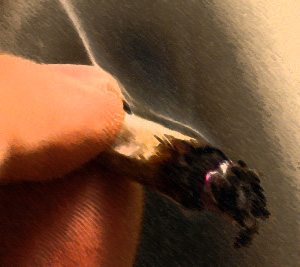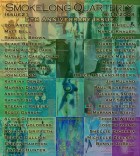I love the possessiveness of the child in this. As a parent, I see it in my own kids every day. What child or children do you see this in? Memories of yourself as a child? A child you know now?
I don’t think this is a memory of myself, and I don’t really know many children now. I guess it just seemed plausible to me that the father, when sleeping and barely animate, could seem like a toy. Adults are constantly providing answers and routines for children, and maybe because of that children have moments when they desire to experiment with control over something else—maybe by poking at an insect, maybe by cutting a doll’s hair. When the father in this piece is sleeping, he is fascinating, and also vulnerable.
You also write for children, having recently published Maya’s Magic Carpet. Can you tell us more about the book?
It’s a story written in limericks about a Spanish girl who dreams of world travel, discovers a magic carpet, meets a friend in France, and sees a ballet. I wrote the story when I was fourteen and fifteen, with my mom’s encouragement, expecting that it would be published since I believed it was better than most of what was out there for children. Now that I think about it, I remember also having intended to make it into a series. I was completely naïve, and after receiving 20 or so rejection letters, I set the story aside as a failed first attempt. Now I appreciate having been toughened to rejection at a young age.
When I first got to college I found out about a campus group that paired student artists and writers to create children’s books for kids in Detroit. I revisited Maya’s Magic Carpet and decided I was still pretty impressed with my rhymes, even though I sometimes cringed at the lack of originality in the story. I used the story anyhow, and the illustrator and I won the second annual contest from this student group. We received funding to have 500 copies of our book self-published and were able to visit Detroit classrooms to read with the kids and give them free copies. Although I joined the group for a personal opportunity, I’m much more concerned now with what the organization does for the kids than what it did for me. I’m still involved and will be editing for our publishing branch in the fall.
Related to that, how is the process different for you when writing for such different audiences? Clearly, the end product is much different, but in the act of writing itself, do you find yourself engaging differently? Any differences that surprise you?
There have been differences, but it has seemed natural, because I’ve always written for people around my own age group. That said, I hope some people of other ages can still connect with what I do. When I wrote Maya’s Magic Carpet, I was basically still a kid. I remember sitting at my kitchen counter for about an hour at a time trying to come up with a limerick, then reading it to my mom and dad. A couple years later, I would start writing “adult” poetry, which would involve me typing angsty stuff at our computer late at night and being completely afraid of anyone ever reading it. Which is still the beginning of my process, basically.
Besides the context of the writing, I think working with “adult” stuff also requires me to trust my sensibilities more. I like literature because it sometimes allows me surprisingly direct access to another person’s experience. In order to write the kind of story or poem I want to contribute, I have to believe that my individual perceptions could interest others. I usually don’t end up writing fiction or poetry about myself. But I think I still have to know myself in a way that wasn’t so important when writing my children’s story, because I’m trying to infuse my “adult” work with more human complexity.
You’re currently studying English and Political Science. How do the two interact? How do they each inform your writing?
Most people’s immediate thought is that I’m planning on going to law school. I like this question, because I think they absolutely interact, and I’m not going to law school. I am fascinated by Adrienne Rich’s poetry, partly because she doesn’t shy away from the most difficult issues we face, politically or otherwise. I haven’t written enough “political” stuff to call myself a “political” writer, but still, I like to write into my stories and poems a sense of things encroaching on other things. I don’t think art and sociopolitical issues belong in separate boxes, or that anything can belong in separate boxes, really.
Given that this issue marks our fifth anniversary, it has me asking the Joyce Carol Oates questions of “Where are you going? Where have you been?” Where do see yourself going in the next five years? Do you see writing as a big part of that?
I want to go into non-profit work, particularly for a human rights organization. So, I’m going into something that may or may not involve writing, but I could never imagine not writing. I’m somewhat afraid both of losing my commitment to writing and my commitment to working toward a just world, but I don’t really expect to lose either.



 The core workshop of SmokeLong Fitness is all in writing, so you can take part from anywhere at anytime. We are excited about creating a supportive, consistent and structured environment for flash writers to work on their craft in a community. We are thrilled and proud to say that our workshop participants have won, placed, or been listed in every major flash competition. Community works.
The core workshop of SmokeLong Fitness is all in writing, so you can take part from anywhere at anytime. We are excited about creating a supportive, consistent and structured environment for flash writers to work on their craft in a community. We are thrilled and proud to say that our workshop participants have won, placed, or been listed in every major flash competition. Community works.